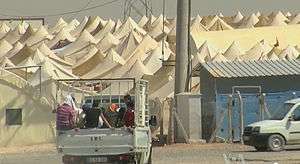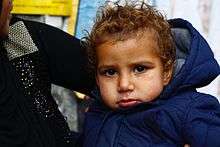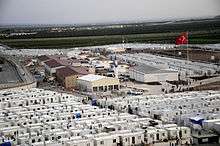Refugees of the Syrian Civil War in Turkey
Refugees of the Syrian Civil War in Turkey are the Syrian refugees originated from Syrian Civil War, Turkey is hosting over 3.6 million (2019 number) "registered" refugees and delivered aid reaching $24 billion (total between 2011–2018) on refugee assistance. The large scale return to Syria uncertain (unending conflict), Turkey has focused on how to manage their presence, more registered refugees than any other country, in Turkish society by addressing their legal status, basic needs, employment, education, and impact on local communities.[1]
 | |
|---|---|
| Population 21 ±.5: Displaced 6 ±.5, Refugee 5.5 ±.5, Casualty 0.5 ±.1 (millions) | |
| Syrian refugees | |
| By country | Turkey, Lebanon, Jordan, Egypt |
| Settlements | Camps: (Jordan) |
| Displaced Syrians | |
| De-escalation | Safe zone |
| Casualties of the war | |
| Crimes | Human rights violations, Massacres, Rape |
| Return of refugees · Refugees as weapons · Prosecution of war criminals | |
As part of Turkey's migrant crisis, according to UNHCR, in 2018 Turkey was hosting 63.4% of all the refugees in the world, that is 3,564,919 "registered" refugees from Middle East, Africa, and Afghanistan in total.[2]
Statistics
3,658,250 (registered September 2019)[3]

Milestones
- June, 2011: Refugee flow into Turkey with the military siege of Jisr al-Shughour in the northwestern part of Syria.
- November, 2011: Turkey had spent up to $15 million to set up six camps for thousands of refugees and military defectors, however Turkish officials declare that Syrians are "guests" and not "refugees."
- April, 2012: Refugee flow ahead of UN ceasefire. Over 2,500 swell across Turkish-Syrian border in one day, the highest ever recorded.
- July, 2012: Refugee flow ahead of fighting in Aleppo.
- September, 2012: UNHCR reports that more than 11,000 Syrians flee into Turkey in a day's time.
Settlement (repatriation, transit)
In 2014, the capacity of the camps established in 2012 and 2013 became insufficient.[4] In 2014, refugees according to their own preferences begin to migrate across provinces.[4]
About 30% live in 22 government-run camps near the Syrian border.[5]
The number of refugees in transit to Europe dramatically increased in 2015. \[6]
Citizenship
Up to 300,000 Syrian refugees living in Turkey could be given citizenship under a plan to keep wealthy and educated Syrians in the country.[7]
Conditions


.jpg)

As of April 2014 (2011–2014)[8]:
- 595,280 individuals reached through information campaigns, participatory assessments, activities to raise public awareness on rights, entitlements, services and assistance;
- 205,899 children with protection needs were identified and referred to services;
- 115,225 children participated in structured, sustained child protection or psycho-social support programme;
- 145,433 youth and adolescents have attended empowerment programme enhancing their participation, communication, peer-to-peer interaction and self-confidence;
- 18,793 Individuals, including children, have reached through community-based initiatives for prevention and mitigation of gender-based violence;
As of April 2018 (2011–2018):[9]
- 593,616 individuals have received hygiene kits, dignity kits or sanitary items;
- 87,198 individuals have benefitted from assistance in accessing adequate shelter solutions;
- 470,000 Syrians and host community members have benefitted from improved municipal services, focusing among others on waste and waste water management.
Financial Aid
Turkey allocated 30 billion between 2011–2018 on refugee assistance.[1]
Over 13 million Syrians received aid from the Turkish Aid Agency (AFAD). Turkey has spent more than any other country on Syrian refugee aid, and has also been subject to criticism for opening refugee camps on the Syrian side of the border.[10]
Financial aid from other countries to Syrian Refugees has been limited, though €3,200,000,000 was promised by the EU in November 2015.[11] In March 2016, the EU and Turkey agreed on the EU-Turkey Statement, which involved a number of political concessions as well as 'another €3 billion in aid, if Turkey agreed to a readmission of Syrians arriving in Greece and tighter border controls.'[12]
Employment
Under Turkish law, Syrian refugees cannot apply for resettlement but only temporary protection status. Registering for temporary protection status gives access to state services such as health and education, as well as the right to apply for a work permit in certain geographic areas and professions. Over a third of urban refugees are not registered.
A study which was supported by the Istanbul University Scientific Research Projects unit and conducted by academics from a number of universities, revealed that the vast majority of Syrians in Turkey are employed in unregistered work for significantly lower wages compared to their Turkish counterparts.[13]
However compared to the increase in refugees, benefits towards them weren't increased as much as only 712,218 were given residency permits only 56,024 work permits were given to the Syrians by 2017.[14]
Housing
Turkey's response to the refugee crisis is different from most other countries. As a World Bank report noted: It is a non-camp and government financed approach, as opposed to directing refugees into camps that rely on humanitarian aid agencies for support.[15]
Education
The goal of the Turkey is providing efforts to ensure that all refugee children can access a form of learning and be fully integrated into the formal education system. The facts are:
As of [unknown date], Currently, 30% of Syrian refugee children have access to education, 4,000 businesses have been opened, and several Syrian refugee camps have grown into small towns with amenities from healthcare to barber shops.[?citation]
As of March 2018, about 60% (600,000 primary and secondary education) of Syrian school-aged children under temporary protection remain in school.[20] The EU has supported education, through a € 300 million direct grant to the Ministry of National Education.[20] Turkey's educational support:[20]
- National Conditional Cash Transfers for Education of 2017 (CCTE): 300,000 Syrian children's family received. Cash Transfers to families encourages (1) enrollment, (2) improves school attendance (3) referral of children at risk to Child Protective Services
- Early childhood and pre-primary education: 45,580 enrollment.
- Formal education (Grades 1–12): 612,603 enrollment.
- Informal non-accredited education (Sunday school): 20,806 enrollment.
- State universities: 19,332 enrollement (Turkey waived tuition fees)
- Accelerated Learning Programme (ALP): targeting 10 to 18-year-old out-of-school adolescents.
- Teachers and education personnel: 128,843 education personnel acquired special training. 12,965 Syrian volunteer trainers and education personnel were provided with financial compensation.
Healthcare
As of October 2014 (2011–2014), Turkey provided with its own resources:[4]
- 250,000 inpatient care;
- 200,000 operated on;
- 150,000 births;
- 6 million consultations
See also
- Syrian Civil War
- Refugees of the Syrian Civil War
- Syrians in Turkey
References
- Jim Zanotti, Turkey: Background and U.S. Relations In Brief, February 8, 2019, page 13, Congressional Research Service https://crsreports.congress.gov R44000
- "Total Persons of Concern by Country of Asylum". data2. UNHCR. Retrieved 24 September 2018.
- "UNHCR Syria Regional Refugee Response -Turkey". UNHCR Syria Regional Refugee Response. 5 September 2019. Retrieved 9 September 2019.
- Boluk, Gulden (2016). "Syrian Refugees in Turkey: between Heaven and Hell?" (PDF). Mediterranean Yearbook (Observatory of Euro Mediterranean policies) ) (2016): 119. Retrieved 29 July 2019.
- "Turkey – Syrian Refugees". Archived from the original on 12 March 2015. Retrieved 11 June 2015.
- Boluk, Gulden (2016). "Syrian Refugees in Turkey: between Heaven and Hell?" (PDF). Mediterranean Yearbook (Observatory of Euro Mediterranean policies) ) (2016): 118. Retrieved 29 July 2019.
- AFP. "Up to 300,000 Syrians could get Turkish citizenship: report".
- Editorial (24 April 2018). "Assistance to Syrian refugees in Turkey” Conference document (PDF). Brussels: Brussels II Conference. p. 2. Retrieved 29 July 2019. Content is copied from this source, which is © European Union, 1995-2018. Reuse is authorised, provided the source is acknowledged. Conference declaration was drafted by the European Union in close co-ordination with the Turkish Government and the United Nations
- Editorial (24 April 2018). "Assistance to Syrian refugees in Turkey” Conference document (PDF). Brussels: Brussels II Conference. p. 3. Retrieved 29 July 2019. Content is copied from this source, which is © European Union, 1995-2018. Reuse is authorised, provided the source is acknowledged. Conference declaration was drafted by the European Union in close co-ordination with the Turkish Government and the United Nations.
- "Syrian Refugees in Turkey: The Long Road Ahead". Migration Policy Instıtute. Retrieved 3 May 2015.
- Kanter, James (29 November 2015). "Turkey, EU agree 3-billion-euro aid deal to stem migrant crisis". New York Times. Retrieved 14 February 2016.
- Tsourapas, Gerasimos (2019-10-01). "The Syrian Refugee Crisis and Foreign Policy Decision-Making in Jordan, Lebanon, and Turkey". Journal of Global Security Studies. 4 (4): 464–481. doi:10.1093/jogss/ogz016. ISSN 2057-3170.
- "Majority of Syrians in Turkey employed in unregistered work for lower wages: Survey – LABOR". Hürriyet Daily News – LEADING NEWS SOURCE FOR TURKEY AND THE REGION. Retrieved 25 October 2017.
- cagaptay, Soner. "Syrian Refugees in Turkey". The Washington Institute for Near East Policy. Retrieved 22 August 2018.
- "Turkey's Response to the Syrian Refugee Crisis and the Road Ahead". World Bank. Retrieved 28 May 2017.
- "Palestinians Were Spared Turkey's Rising anti-Arab Hate. Until Now". Haaretz. 2019-07-16. Retrieved 2019-08-27.
- Tremblay, Pinar (2014-08-21). "Anti-Arab sentiment on rise in Turkey". Al-Monitor. Retrieved 2019-08-27.
- "Syrian refugees who were welcomed in Turkey now face backlash". NBC News. Retrieved 2019-08-27.
- Halis, Mujgan (2013-11-13). "Anti-Syrian sentiment on the rise in Turkey". Al-Monitor (in Turkish). Retrieved 2019-08-29.
- Editorial (24 April 2018). "Assistance to Syrian refugees in Turkey” Conference document (PDF). Brussels: Brussels II Conference. p. 3. Retrieved 29 July 2019. Content is copied from this source, which is © European Union, 1995-2018. Reuse is authorised, provided the source is acknowledged. Conference declaration was drafted by the European Union in close co-ordination with the Turkish Government and the United Nations
